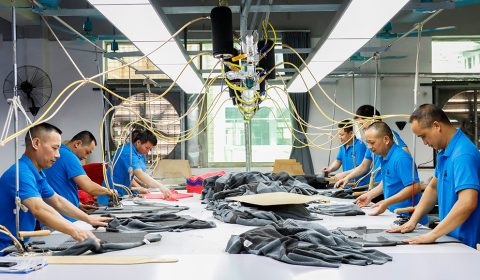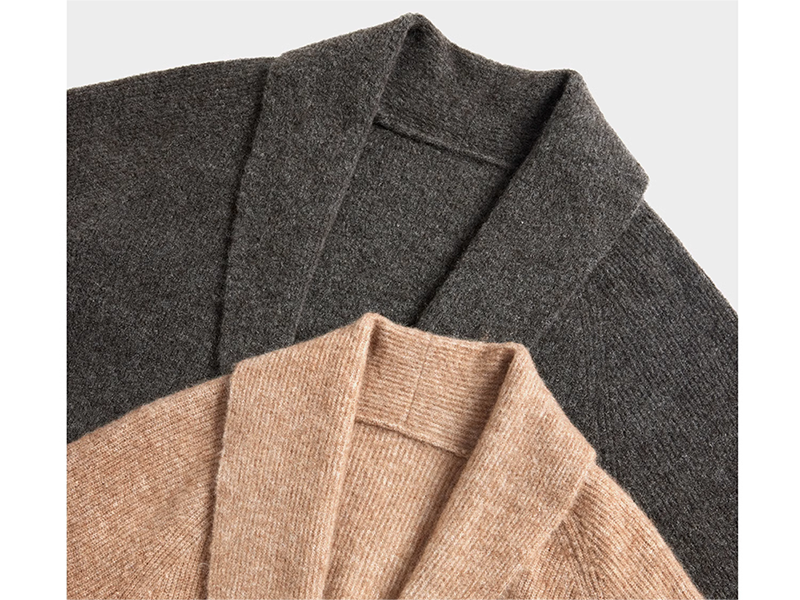As an important part of the garment industry, sweater manufacturing industry plays a vital role. Sweaters are not only basic for People’s Daily wear, but also one of the important elements of winter fashion. With the ever-changing fashion trends and increasing consumer demand for quality, sweater manufacturers are facing increasingly fierce competition in the market. In this highly competitive environment, customer service and after-sales support systems have become a key factor in whether companies can stand out and win in the market.
Competitive market environment
With the rapid development of the fashion industry, sweater design is changing with each passing day. Each season will emerge a variety of new styles, new colors, to choose from more and more wide. Therefore, sweater manufacturers need to constantly innovate, timely grasp the fashion trend, and launch products that meet the market demand to attract more customers.
In sweater products, quality is one of the most concerned factors for customers. The comfort, warmth and durability of sweaters directly affect customers’ purchasing decisions. Therefore, sweater manufacturers must strictly control product quality, choose high-quality raw materials, fine production of each sweater, to ensure that the quality of the product meets customer expectations.
The importance of customer service and after-sales support system
Quality customer service and after-sales support can effectively enhance the brand image. When customers get a good service experience in the purchase process and can get timely and effective after-sales support when they encounter problems, they will trust and prefer the brand more, thus enhancing brand loyalty and bringing more repeat customers and word-of-mouth publicity for the enterprise.
In the case of fierce market competition, only by constantly improving the level of customer service and after-sales support quality, in order to be in an invincible position in the fierce competition. By providing a full range of customer service, meeting the individual needs of customers, as well as timely and effective after-sales support, enterprises can attract more customers, win market share, and enhance the competitiveness of enterprises.
Provide comprehensive customer service channels
In the highly competitive sweater manufacturing industry, providing customers with diversified service channels is a key part of ensuring customer satisfaction. The comprehensive coverage of channels such as phone, email and online chat provides customers with a variety of options to meet the communication preferences and needs of different customers. Telephone service is direct and efficient for customers who prefer immediate resolution of problems; Email offers a convenient alternative for those who prefer written communication; Online chat, on the other hand, combines the advantages of immediacy and written records to provide customers with a more flexible way to communicate.
While providing these service channels, sweater manufacturers also pay attention to the collaboration between channels to ensure the smooth transmission of customer information. By integrating these channels, manufacturers are able to achieve more efficient problem solving and customer communication, thereby improving the overall level of customer service. This not only helps to improve customer satisfaction, but also to gain word-of-mouth and loyalty for the business.
Train staff to ensure a high level of service
Training is an important means to ensure that employees are competent in customer service. Sweater manufacturers place employee training at a strategic level to ensure they have sufficient expertise and good communication skills. The training covers product knowledge, customer communication skills, problem solving skills, etc. The aim is to enable employees to understand customer needs and respond quickly and accurately.
Through continuous training programs, employees are able to continuously improve their professionalism and adapt to the changing needs of the market and customers. Sweater manufacturers encourage employees to participate in training courses and workshops to stay informed of the latest trends and technologies in the industry. This not only helps to improve the quality of customer service, but also provides career development opportunities for employees and enhances the competitiveness of the entire enterprise.
Through such training initiatives, sweater manufacturers not only provide professional services to customers, but also improve the professional quality of employees, and lay a solid foundation for the sustainable development of the enterprise.
Provide fast and efficient after-sales service
After-sales service is a key link for an enterprise to demonstrate integrity and professionalism. Sweater manufacturers need to ensure that their after-sales service teams can respond quickly when customers need them and solve problems in an efficient manner. Rapid response not only improves the customer experience, but also reduces customer waiting time and enhances customer trust in the brand.
Rapid response requires an efficient after-sales service team. This means that enterprises need to fully train and prepare after-sales service personnel, so that they can skillfully deal with various after-sales issues, and can make the right decision in the shortest time. The after-sales service team needs to have good communication skills and problem solving skills in order to communicate effectively with customers and solve problems in a timely manner.
In order to achieve rapid response, enterprises can adopt advanced technologies and systems. For example, establish an efficient after-sales service hotline or online customer service platform, through which customers can contact the company’s after-sales service team at any time, feedback problems and seek help. At the same time, intelligent customer service systems or automated processes can be used to deal with some common after-sales problems to speed up the processing.
Effective management of the after-sales service process is also the key to achieving rapid response. Companies can develop clear after-sales service processes and standard operating procedures to ensure that every after-sales request can be assigned and processed in a timely manner. By optimizing the process, eliminating redundant steps and reducing wait times, the efficiency and response time of after-sales service can be greatly improved.
To sum up, providing fast and efficient after-sales service is an important part of sweater manufacturers’ after-sales support system. By training professional after-sales service teams, adopting advanced technologies and systems, and optimizing service processes, companies can ensure that customers receive timely and effective help when they encounter problems, thereby enhancing customer satisfaction and enhancing brand image.
Establish customer feedback mechanism
Establishing a customer feedback mechanism is a key step for sweater manufacturers to achieve continuous improvement. The opinions and suggestions of customers are crucial for enterprises to improve the quality of after-sales service and enhance customer satisfaction. By establishing an effective feedback mechanism, enterprises can collect feedback information from customers in a timely manner, and adjust and improve their after-sales service strategies and processes according to this information.
The establishment of customer feedback mechanism requires a proper channel for customer feedback. For example, a feedback form or suggestion box can be set up on a company’s official website or mobile app so that customers can easily submit their comments and suggestions. In addition, customer feedback can also be collected through channels such as phone, email or social media.
Businesses need to respond to customer feedback in a timely manner. Customers expect their opinions and suggestions to be valued and responded to, so businesses need to make sure they respond to feedback as soon as they receive it and take practical action to fix the problem. Responding to customer feedback in a timely manner can not only enhance customer trust, but also enhance customer satisfaction with the company.
Companies can also analyze customer feedback on a regular basis to identify problems and make continuous improvements. By collecting and sorting customer feedback data, enterprises can find some potential problems and room for improvement, and adjust and improve their after-sales service strategies and processes according to this information to enhance customer satisfaction and brand image.
The establishment of customer feedback mechanism is an important part of sweater manufacturer’s after-sales support system. By establishing appropriate feedback channels, responding to customer feedback in a timely manner, and continuously improving after-sales service quality, enterprises can better meet customer needs, enhance customer satisfaction, and win customer loyalty.




 English
English Deutsch
Deutsch Français
Français Italiano
Italiano Español
Español Русский
Русский Polski
Polski Nederlands
Nederlands Svenska
Svenska

